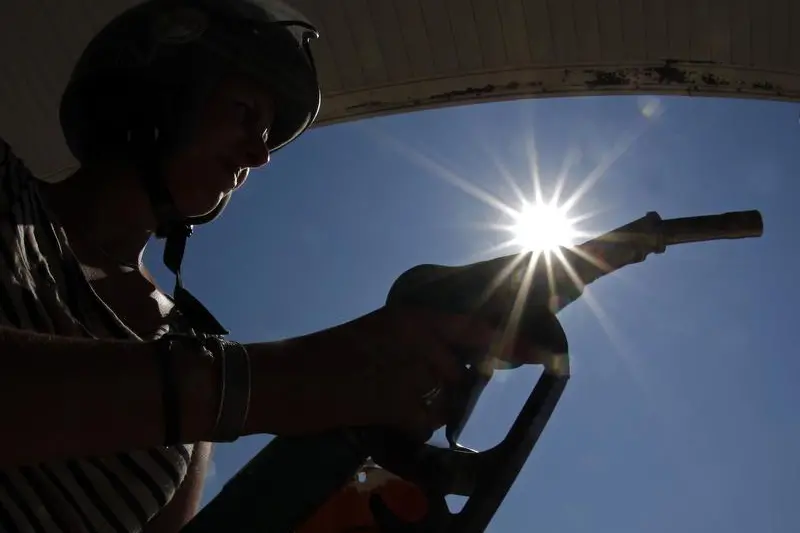PHOTO
ALGIERS - Algeria plans to raise prices of subsidised gasoline and diesel for a third straight year in 2018 to cut domestic consumption and imports at a time of growing pressure on state finances, according to an official document seen by Reuters.
The government also plans to raise taxes and introduce new levies on local and imported goods such as tobacco next year as it seeks to diversify revenues from the economy due to a sharp fall in energy earnings, the document shows.
Energy revenues have fallen by more than half since crude oil prices started sliding in mid-2014, forcing the OPEC member to consider reforms, including reductions in subsidies.
Oil and gas comprise 60 percent of the budget and 95 percent of total exports for the North African country, which has so far failed to develop its non-hydrocarbon sector due to bureaucratic obstacles and lack of investment.
The government in 2016 approved a first rise in more than a decade for gasoline and diesel prices.
Under the new plan, the retail price for premium gasoline, unleaded gasoline and regular gasoline will rise by 16.65 percent, 16.84 percent and 18.20 percent per litre respectively, while the diesel price is set to go up by 11.65 percent in 2018.
The fuel price rises need approval by parliament, where government supporters have an overwhelming majority.
Authorities say that subsidies for basic products such as cereals, sugar and cooking oil will be maintained.
Domestic prices for energy products are very low by international standards. Unleaded gasoline costs now 35.33 dinars (31 U.S. cents) per litre.
"This gradual approach of the adjustment of fuel prices is aimed at rationalising consumption, reducing imports, increasing tax revenue and reducing subsidies," said the document.
The gasoline and diesel price hikes will be accompanied by new and higher taxes for several products next year, it added.
Taxes on tobacco would increase by 10 percent, while levies for instant coffee, LED torches, almonds and all dried fruits are set to reach 30 percent from 5 percent currently.
Algeria plans also for the first time a wealth tax that will affect 90 percent of Algerians, according to the government.
Algeria need to boost tax revenues as the government said last week it wanted to increase state spending by 25 percent in 2018 to help launch delayed education, health and water resources projects. In 2016 and 2017, spending fell.
Energy product consumption has in recent years significantly risen in the nation of 41 million people, hitting export volumes and pushing the government to consider exploiting non-conventional energies.
"If we continue to consume without thinking about increasing our production, by 2025 all our production capacity will be destined to national consumption," state news agency APS quoted Energy Minister Mustapha Guitouni as saying late on Monday.
He was referring to a long-term government plan to improve energy output by turning to shale gas.
(Reporting by Hamid Ould Ahmed; Editing by Ulf Laessing and Mark Heinrich) ((hamid.ouldahmed@thomsonreuters.com;))
The government also plans to raise taxes and introduce new levies on local and imported goods such as tobacco next year as it seeks to diversify revenues from the economy due to a sharp fall in energy earnings, the document shows.
Energy revenues have fallen by more than half since crude oil prices started sliding in mid-2014, forcing the OPEC member to consider reforms, including reductions in subsidies.
Oil and gas comprise 60 percent of the budget and 95 percent of total exports for the North African country, which has so far failed to develop its non-hydrocarbon sector due to bureaucratic obstacles and lack of investment.
The government in 2016 approved a first rise in more than a decade for gasoline and diesel prices.
Under the new plan, the retail price for premium gasoline, unleaded gasoline and regular gasoline will rise by 16.65 percent, 16.84 percent and 18.20 percent per litre respectively, while the diesel price is set to go up by 11.65 percent in 2018.
The fuel price rises need approval by parliament, where government supporters have an overwhelming majority.
Authorities say that subsidies for basic products such as cereals, sugar and cooking oil will be maintained.
Domestic prices for energy products are very low by international standards. Unleaded gasoline costs now 35.33 dinars (31 U.S. cents) per litre.
"This gradual approach of the adjustment of fuel prices is aimed at rationalising consumption, reducing imports, increasing tax revenue and reducing subsidies," said the document.
The gasoline and diesel price hikes will be accompanied by new and higher taxes for several products next year, it added.
Taxes on tobacco would increase by 10 percent, while levies for instant coffee, LED torches, almonds and all dried fruits are set to reach 30 percent from 5 percent currently.
Algeria plans also for the first time a wealth tax that will affect 90 percent of Algerians, according to the government.
Algeria need to boost tax revenues as the government said last week it wanted to increase state spending by 25 percent in 2018 to help launch delayed education, health and water resources projects. In 2016 and 2017, spending fell.
Energy product consumption has in recent years significantly risen in the nation of 41 million people, hitting export volumes and pushing the government to consider exploiting non-conventional energies.
"If we continue to consume without thinking about increasing our production, by 2025 all our production capacity will be destined to national consumption," state news agency APS quoted Energy Minister Mustapha Guitouni as saying late on Monday.
He was referring to a long-term government plan to improve energy output by turning to shale gas.
(Reporting by Hamid Ould Ahmed; Editing by Ulf Laessing and Mark Heinrich) ((hamid.ouldahmed@thomsonreuters.com;))





















